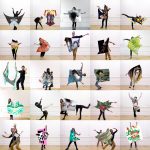Yen-Ting Cho
Most Recent Affiliation:
- National Chang Kung University, Institute of Creative Industries Design and Master Program on Techno Art, Assistant Professor
Location:
- Taiwan
Bio:
Dr. Yen-Ting Cho is a designer, artist and researcher with expertise in interdisciplinary digital design methods, including architecture, interaction design, and animation. He has a PhD in Innovation Design Engineering (IDE) from the Royal College of Art (RCA), London; and a Master’s degree from the Graduate School of Design (GSD), Harvard University. He was awarded Film Study Center Harvard Fellowships for three years and his animation practice has received awards internationally. He has worked at INVIVIA (Cambridge, MA), and designed interactions for Microsoft Surface, GSD and the Guggenheim Museum, New York. He was a visiting tutor in IDE at the RCA where his doctoral research was on ‘Cubic Film: Interdisciplinary Development of a Digital Participatory Moving Image Medium’. Yen-Ting Cho leads his London-based digital design studio, and he is an Assistant Professor in the Institute of Creative Industries Design and Master Program on Techno Art at National Cheng Kung University, Taiwan and a consultant for the university’s Culture and Creativity Incubation and R&D Center.
Writings and Presentations:
-
Title:
MovISee
Writing Type: Sketch / Art Talk
Author(s):
Exhibition: SIGGRAPH Asia 2016: Mediated Aesthetics
Abstract Summary:MovISee is a digital software for people to create personal visual outputs. We use a depth camera to create mixed reality for people to explore the selected information and ultimately transform their understanding the ability of their body movement to create composite
customized visual outputs. In short, it is a system to recreate information and explore personal creativity. The results reveal the sedimentary relative movements through filming; time and space are deconstructed to the extent that meaning is shifted and interpretations become multifaceted; multi-layered images are created in which the fragility and instability of our reality is questioned.
Role(s):





